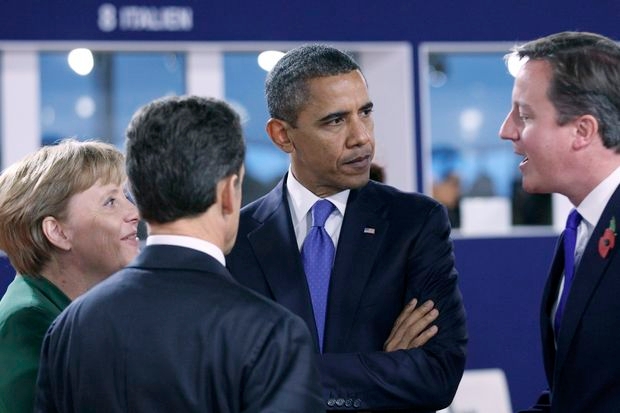Whether it wants to or not, Washington has a role to play in the UK’s EU debate. Eurosceptics and Europhiles constantly wrangle over what the US position is on Brexit, splitting hairs interpreting State Department officials’ carefully worded remarks in order to claim victory for their side.
The latest episode in this running saga sees the sceptics feeling vindicated by Washington’s exasperation with the EU. Assistant Secretary of State (for European Affairs no less) Victoria Nuland appears to have landed herself in some rather hot water – both diplomatic and political. In a reportedly leaked phone call to the US ambassador to Ukraine, Nuland is heard unceremoniously blasting the EU and pushing the UN to take over in mediating the escalating crisis in Kiev.
‘F–k the EU’, she says, adding that what’s needed is ‘help [to] glue this thing and to have the UN glue it’.
Many have been quick to point out that this episode underscores the fact that the unofficial State Department line on Brussels is in practice quite different to the official position in principle, and on some levels this is is true.
When Nuland’s predecessor Philip Gordon opined last January that ‘a strong British voice in the European Union’ was ‘in the American interest’, pro-EU campaigners claimed victory. Critics pointed out that Gordon had a track record of advocating European integration as an academic prior to his appointment, reflecting a more biased personal opinion than the official line from Washington.
The point is that the US does not understand nor is interested in how the EU works. The US attaches great significance in public to the EU’s ‘soft power’ in drawing Eastern European countries away from Russia’s orbit and triggering democratic reforms perceived as necessary to join an influential and very Western club. But when it comes down to business behind closed doors, Washington often grows impatient at the pace of negotiations with the EU on everything from trade to foreign policy.
The complex machinery of Brussels decision-making is well-known in Britain. To the Americans, it’s a mind-boggling juggernaut, stemming chiefly from a lack of understanding about issues of sovereignty and the reality of trying to shape common policies out of the politics of 28 different countries. Washington’s mindset is ‘just get it done’, and the concept of endless discussions between multiple EU institutions just to reach a consensus is something US officials struggle to get their heads around.
Though he has since disavowed himself of the now-infamous quip, Henry Kissinger said it all when he exasperatedly queried ‘who do I call if I want to speak to Europe?’. For all intensive purposes, there are many in Washington who – through no ideological purpose – approach the EU as a United States of Europe by default. And when things don’t work in the way they expect this would mean, a lot of head-scratching ensues.
Most Americans don’t understand that the European project isn’t the seamless machine they expect to operate, and they’ve little interest in finding out why. US Treasury officials have privately admitted their frustration that the eurozone’s banking union has become such a protracted and complex exercise with no end in sight. And in this instance, it is Germany’s stubborn resistance which is holding up progress, rather than Britain’s for once.
The answer does not simply lie in Europe getting its act together and becoming a carbon copy of the US federalist model. For one thing, this would require the EU to become the fiscal transfer union that Berlin will never allow. And the likelihood of Brussels developing a coherent Common Foreign and Security Policy remains a distant dream.
Instead, much as it always does, the US will have to work behind the scenes on a with individual countries to advance their collective interests. And Washington would do well to brush up on its history of European integration, so that its dealings with the bloc better reflect an understanding of what to expect and how to respond when the limits of integration are tested.
Will the US get to the point Britain is at now, where frustration means that it contemplates casting the EU aside as an integral partner? Doubtful. But it might take more of a sympathetic interest when the UK airs its grievances about the sclerosis that in spite of the best of intentions, Europe often finds itself in. It may just take the Americans telling Brussels to reform or face decline to get the ball rolling. Britain has been trying long enough.






Comments